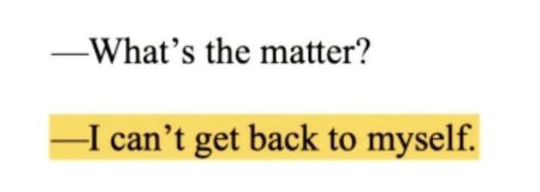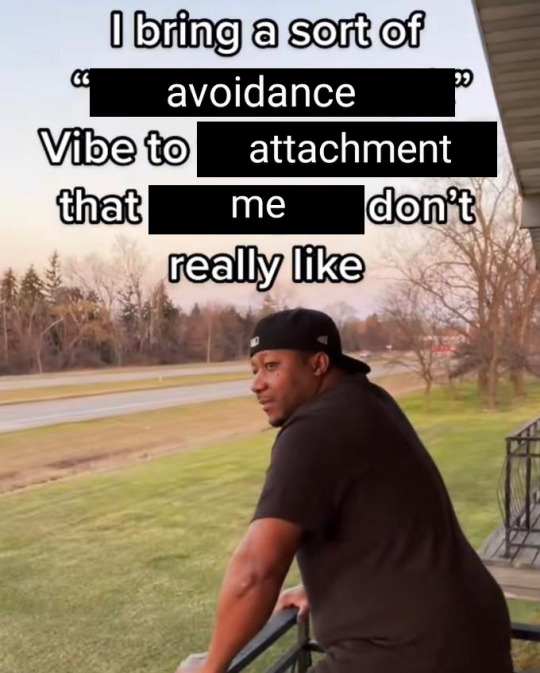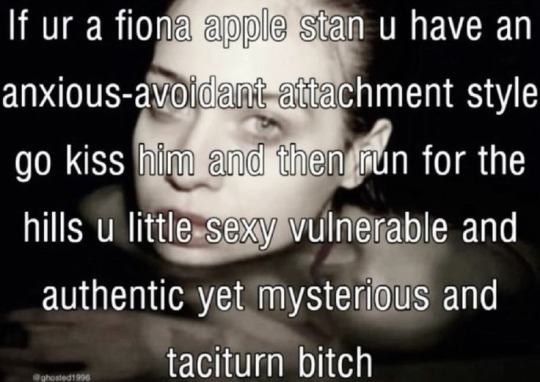#avoidant attachment
Text
my attachment style is both anxious and avoidant.
i have a hard time expressing that i care about you but don’t you dare leave me
#actually aspd#actually npd#aspd#npd#clusterb#actually mentally ill#actually bpd#actuallyaspd#actuallynpd#cluster b#actuallybpd#actually cluster b#cluster b personality disorder#attachment issues#actually borderline#actually narcissistic#actually antisocial#antisocial personality disorder#narcissistic personality disorder#borderline personality disorder#avoidant attachment#anxious attachment#narc abuse isnt real#narc abuse isn't real#attachment styles#bpd safe#aspd safe#npd safe#mental illness#abandonment issues
30 notes
·
View notes
Text
Self-aware of my self-destruction, yet unable to stop myself.
#bpd problems#bpd#bpd memes#fearful avoidant#fearful avoidant attachment#avoidant attachment#cluster b problems#ptsd#actually cptsd#actually bpd#self destruction#self aware queen#self sabotage
9K notes
·
View notes
Text










louise glück, the white series // claude monet, houses in the snow // fyodor dostoyevsky, the gentle spirit // jane o. wayne, with solitude //reddit user artsykate, winter nocturne with lonely road // joseph brodsky, to m.b. // fyodor dostoevsky, poor folk // caspar david friedrich, winter landscape // audre lorde, the cancer journals // mahmoud darwish, memory for forgetfulness
#on isolation#on loneliness#on isolating#on self sabotage#web weaving#web weave#poetry#poetry collage#dark academia#winter#on depression#dark art#poetry collection#poetry compilation#avoidance#actually avoidant#avoidant attachment#fearful avoidant#mine
1K notes
·
View notes
Text
Attachment Styles in Relationships
Attachment styles are the ways people feel and act in relationships, based on their early experiences with parent or guardian. There are four main types:
Secure Attachment:
Healthy: Feeling comfortable with your partner and being able to share your feelings and needs openly. Trusting them and supporting each other without feeling overly worried about the relationship.
Unhealthy: Becoming overly dependent on your partner, feeling anxious or upset if they spend time away, or constantly seeking reassurance and validation.
Anxious Attachment:
Healthy: Expressing your emotions and needs to your partner, and valuing emotional closeness. Feeling secure when your partner reassures you and staying connected during difficult times.
Unhealthy: Constantly worrying about your partner leaving you, feeling jealous and possessive, or becoming too clingy and demanding in the relationship.
Avoidant Attachment:
Healthy: Valuing your independence and personal space while still being supportive and caring toward your partner. Understanding your emotions and expressing them in a balanced way.
Unhealthy: Pushing your partner away emotionally, avoiding discussions about feelings or conflicts, or being emotionally distant and unavailable.
Disorganized Attachment:
Healthy: Recognizing and addressing past traumas, working on building trust and emotional stability.
Unhealthy: Reacting impulsively or unpredictably in relationships due to unresolved traumas, struggling with forming and maintaining deep emotional connections, or experiencing extreme emotional highs and lows.
#healthy relationship#toxic relationship#relationships#relationship advice#personal improvement#personal development#emotional attachment#attachment issues#anxious attachment#avoidant attachment#attachment styles#glow up tips#level up journey#personal growth#self development#self improvement#self help#mental health#self love
2K notes
·
View notes
Text
When love is unreliable and you are a child, you assume that it is the nature of love – its quality – to be unreliable. Children do not find fault with their parents until later. In the beginning the love you get is the love that sets.
Jeanette Winterson, Why Be Happy When You Could Be Normal?
#Jeanette Winterson#love#attachment style#insecure attachment#anxious attachment#avoidant attachment#attachment theory#trust#trust issues#relationship#breakup#heartbreak#recovery#healing#self awareness#personal development#personal growth#quotes
1K notes
·
View notes
Text

#trauma#childhood trauma#ptsd#complex post traumatic stress disorder#just cptsd things#actually cptsd#rick and morty#emo#mental instability#bipolar disorder#bpd problems#attachment issues#avoidant attachment#adulting#relationship goals#cptsd coping#cptsd symptoms#emotional#bpd stuff#depression#anxiety funny#funny content#adult swim
928 notes
·
View notes
Text
Disorganized (aka fearful-avoidant) attachment style is overanalyzing/overcorrecting when you think your partner might be pulling away from you, but then pulling away from them when they draw close to you.
It is both craving AND fearing intimacy so deeply that you grip people tight in your hands lest they leave you, but keep them at an arms length lest they love you.
#disorganized attachment#disorganized attachment style#fearful avoidant#fearful avoidant attachment#fearful avoidant attachment style#attachment styles#attachment theory#anxious attachment#avoidant attachment#relationships#long distance relationship#long distance relationships#ldr#ldr love#queer relationships#queer love#intimacy#fear of intimacy#craving intimacy#secure attachment style#insecure attachment#insecure attachment styles#attachment styles can be healed#attachment styles can be changed#childhood wounds#healthy relationships#healthy relationships are possible
2K notes
·
View notes
Text

#certified protectcosette original#attachment styles#avoidant attachment#20 club#50 club#100 club#200 club#500 club
916 notes
·
View notes
Text
How does one rewire their brain to accept love
#help#mental illness#mental health#therapy#mommy issues#detachment#inner child#childhood trauma#mitski#girlhood#female hysteria#lana del rey#avoidant attachment#fearful avoidant
399 notes
·
View notes
Text
fictional characters exist so people with attachment issues have something to obsess over
1K notes
·
View notes
Text

#fiona apple#girl blogger#tumblr girls#girlblogging#actually avoidant#avoidant personality disorder#avoidant attachment#anxious avoidant#anxious attachment#gaslight gatekeep girlboss#just girly things#female hysteria#female manipulator#mystery#mysterious beauty#the female urge#the feminine urge#the female experience#divine feminine#divine female#female experience#femininity#femcel#just girls being girls#this is what makes us girls#pretty girls#hyper feminine#mentally unstable#mental health#possession
110 notes
·
View notes
Text
So I came across this video and it blew my mind. All these decades of feeling misunderstood, bullied, laughed at for not being able to remember things, it was all due to childhood trauma. There's justification for the memory loss and I'm not flawed. It's been a hard journey, but change and growth is always hard. Cheers to myself and everyone else going through this super hard journey of abuse/trauma recovery. Every single piece of knowledge we gain about understanding ourselves is a win against those who have used, abused and hurt us so far.
#absurd#mentalhealth#mentalhealthawareness#mental wellbeing#mental health#mental abuse#trauma response#trauma recovery#emotional abuse#avoidant attachment#childhood trauma#trauma#toxic#toxic family#dysfunctional family#toxicity#toxic people#family-trauma
264 notes
·
View notes
Text
“who will come into my kitchen and be hungry for me?” i whisper to myself, knowing full well that anytime someone comes remotely near my kitchen i scramble and hide in the fucking dishwasher
#i have issues with intimacy can u tell#is that sexy?#im working on it in therapy okay???#it’s 2 am and I’m googling ‘how to not be freaked out by acts of affection’#anyway!! this was funny in my head#but not so much on the screen#whatever#also I’m arospec and asexual#so I think that has something to do with it#fearful avoidant#disorganized attachment#aroace#aroace lesbian#attachment issues#avoidant attachment#shitpost
350 notes
·
View notes
Note
bpd culture + anxious/avoidant attachment is seeing your fp talking and laughing with someone else so you think don't look don't look at them don't even acknowledge what's happening just keep smiling because then it can't hurt you just don't look and everything will be fine and then realising this behaviour is reminiscent of a child covering their eyes in the dark because if you cant see the monster then the monster cant hurt you.
- 🍁
.
#bpd + anxious/avoidant culture is#bpd + anxious/avoidant culture#bpd + anxious/avoidant#borderline culture is#borderline personality disorder#bpd culture is#bpd culture#bpd safe#bpd#actually bpd#actually borderline#fp#bpd fp#fp bpd#anxious attachment#avoidant attachment#- 🍁
55 notes
·
View notes
Text

If you know me, you know I am obsessed with neuroscience. I devour countless articles and never miss an opportunity to dive into a book on the topic. I recently came across this, and found it very interesting!
Both attachment and deep love light up different parts of the brain. Attachment mostly uses a part of the brain that's connected to bonding, and chemicals called oxytocin and vasopressin help with this. On the other hand, deep love activates the pleasure and reward parts of the brain. The chemical called dopamine makes us feel really good and excited when we're in love.
You can be very close in a not so good relationships. You might be really attached, but it doesn't mean there's real love or respect between you.
You can feel deeply attached without really being truly in love. Attachment is a bond created with someone based on shared experiences (good or bad), dependency or habit. Experiencing big moments in life together, like moving houses, can bring you closer, even if it's not about love but make it hard to let go for this reason.
Love means having strong and deep feelings towards someone, from really admiring them to deeply caring for them. It's about feeling connected, caring, and drawn to someone. You can have love without attachment. You can care deeply about someone without needing them around all the time. Some believe it's good to love without being too clingy or controlling. So, yes, it's possible to love someone without always being attached to them.
#neuroscience#relationship advice#dating advice#advice#life advice#sex and relationships#healthy relationships#relationships#dating tips#dating#romance#emotional attachment#anxious attachment#avoidant attachment#attachment styles#attachment issues
257 notes
·
View notes
Text
I want someone to know me without me having to let them in. The way they do in books and movies—silently, naturally.
115 notes
·
View notes